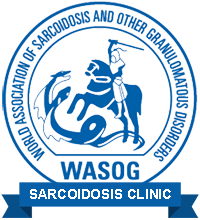Test-retest repeatability for Fatigue Assessment Scale, Short-Form 6-Dimension and King’s Sarcoidosis Questionnaire in people with sarcoidosis associated fatigue.
Keywords:
Sarcoidosis, Fatigue Assessment Scale, Short Form 6-DimensionAbstract
Background and aim: Patient related outcomes are important in sarcoidosis but the medium-term repeatability of the key patient reported outcome measure is not known. We aimed to test the repeatability of the Fatigue Assessment Scale (FAS), Short Form 6-Dimension (SF-6D), and King’s Sarcoidosis Questionnaire (KSQ) in free living people with sarcoidosis associated fatigue. Methods: Twelve people with sarcoidosis associated fatigue completed the FAS, short form 36 questionnaire (SF-36) and the KSQ at baseline and 12 weeks. The SF-6D utility was calculated from the SF-36. The difference between baseline and 12 week assessments was measured. Results: The interclass correlation (95% confidence interval) showed good agreement between the baseline and 3 months measurements: FAS 0.91 (0.74, 0.71), SF-36 0.98 (0.94, 1), KSQ 0.98 (0.93, 0.99), SF-6D utility 0.98 (0.93, 0.99). The baseline (standard deviation) FAS was 27.83 (5.86) and at 12 weeks was 27.25 (7.55) representing 0.58 difference (95% CI for difference (-1.89, 3.06)), SF-6D utility was 0.69 (0.16) at baseline and 0.68 (0.17) after 3 months representing at 0.00 (-0.03, 0.03) difference and corresponding values for KSQ were 59.12 (18.68) and 56.91 (27.26) with a difference of -1.87 (5.49,1.76). Conclusions: There was good repeatability of FAS, SF-36, SF-6D and KSQ in free living people with sarcoidosis associated fatigue. Fatigue, general and disease specific health related quality of life showed no significant change over a 12 week period. Studies identifying changes in these outcomes can confidently report a true change and not measurement error or regression to the mean.
References
Bradley B, Branley HM, Egan JJ, et al. Interstitial lung disease guideline: the British Thoracic Society in collaboration with the Thoracic Society of Australia and New Zealand and the Irish Thoracic Society. Thorax. 2008;63 Suppl 5:v1-58.
Judson MA. Quality of Life Assessment in Sarcoidosis. Clin Chest Med. 2015;36(4):739-50.
Herdman M, Gudex C, Lloyd A, et al. Development and preliminary testing of the new five-level version of EQ-5D (EQ-5D-5L). Qual Life Res. 2011;20(10):1727-36.
Brazier J, Usherwood T, Harper R, Thomas K. Deriving a preference-based single index from the UK SF-36 Health Survey. J Clin Epidemiol. 1998;51(11):1115-28.
du Bois RM, Greenhalgh PM, Southcott AM, Johnson NM, Harris TA. Randomized trial of inhaled fluticasone propionate in chronic stable pulmonary sarcoidosis: a pilot study. Eur Respir J. 1999;13(6):1345-50.
Atkins C, Fordham R, Clark AB, Stockl A, Jones AP, Wilson AM. Feasibility study of a randomised controlled trial to investigate the treatment of sarcoidosis-associated fatigue with methylphenidate (FaST-MP): a study protocol. BMJ Open. 2017;7(12):e018532.
Patel AS, Siegert RJ, Creamer D, et al. The development and validation of the King's Sarcoidosis Questionnaire for the assessment of health status. Thorax. 2013;68(1):57-65.
Marcellis RG, Lenssen AF, Elfferich MD, et al. Exercise capacity, muscle strength and fatigue in sarcoidosis. Eur Respir J. 2011;38(3):628-34.
Michielsen HJ, Drent M, Peros-Golubicic T, De Vries J. Fatigue is associated with quality of life in sarcoidosis patients. Chest. 2006;130(4):989-94.
Marcellis R, Lenssen A, Drent M, De Vries J. Association between physical functions and quality of life in sarcoidosis. Sarcoidosis Vasc Diffuse Lung Dis. 2014;31(2):117-28
De Vries J, Michielsen H, Van Heck GL, Drent M. Measuring fatigue in sarcoidosis: the Fatigue Assessment Scale (FAS). Br J Health Psychol. 2004;9(Pt 3):279-91.
de Kleijn WPE, De Vries J, Wijnen PAHM, Drent M. Minimal (clinically) important differences for the Fatigue Assessment Scale in sarcoidosis. Respir Med. 2011;105(9):1388-95.
Atkins CJ, A.P.; Wilson, A. M.;. The feasibility of investigating methylphenidate for the treatment of sarcoidosis-associated fatigue (the FaST-MP study) – a double-blind, parallel-arm randomised controlled-trial. Thorax. 2019;74 (Suppl 2).
Garratt AM, Ruta DA, Abdalla MI, Buckingham JK, Russell IT. The SF36 health survey questionnaire: an outcome measure suitable for routine use within the NHS? Bmj. 1993;306(6890):1440-4.
36-Item Short Form Survey (SF-36) Scoring Instructions [Available from: https://www.rand.org/health-care/surveys_tools/mos/36-item-short-form/scoring.html.
1. Finniss DG, Kaptchuk TJ, Miller F, Benedetti F. Biological, clinical, and ethical advances of placebo effects. The Lancet. 2010;375(9715):686–95.
Franke RHK, J. D. The Hawthorne Experiments: First Statistical Interpretation. Am Sociol Rev. 1978;43(5):623-43.
Opiyo RO, Nyasulu PS, Koigi RK, Obondo A, Ogoyi D, Kogi-Makau W. Effect of fish oil omega-3 fatty acids on reduction of depressive symptoms among HIV-seropositive pregnant women: a randomized, double-blind controlled trial. Ann Gen Psychiatry. 2018;17:49.
McCarney R, Warner J, Iliffe S, van Haselen R, Griffin M, Fisher P. The Hawthorne Effect: a randomised, controlled trial. BMC Med Res Methodol. 2007;7:30.
Hoenemeyer TW, Kaptchuk TJ, Mehta TS, Fontaine KR. Open-label placebo treatment for cancer-related fatigue: A randomized-controlled clinical trial. Scientific Reports. 2018;8(1).
Yennurajalingam S, Azhar A, Lu Z, et al. Open-label Placebo for the treatment of cancer-related fatigue in patients with advanced cancer: A randomized controlled trial. The Oncologist. 2022;27(12):1081–9.
Holden JD. Hawthorne effects and research into professional practice. J Eval Clin Pract. 2001;7(1):65-70.
Hrobjartsson A, Gotzsche PC. Is the placebo powerless? An analysis of clinical trials comparing placebo with no treatment. N Engl J Med. 2001;344(21):1594-602.
De Boer S, Wilsher ML. Validation of the Sarcoidosis Health Questionnaire in a non-US population. Respirology. 2012;17(3):519-24.
Downloads
Published
Issue
Section
License
Copyright (c) 2023 Rebecca Ferris, Tun Maung, Christopher Atkins, Dayle Terrington, Allan Clark, Prasad Manivarmane, Andrew Wilson

This work is licensed under a Creative Commons Attribution-NonCommercial 4.0 International License.
This is an Open Access article distributed under the terms of the Creative Commons Attribution License (https://creativecommons.org/licenses/by-nc/4.0) which permits unrestricted use, distribution, and reproduction in any medium, provided the original work is properly cited.
Transfer of Copyright and Permission to Reproduce Parts of Published Papers.
Authors retain the copyright for their published work. No formal permission will be required to reproduce parts (tables or illustrations) of published papers, provided the source is quoted appropriately and reproduction has no commercial intent. Reproductions with commercial intent will require written permission and payment of royalties.

This work is licensed under a Creative Commons Attribution-NonCommercial 4.0 International License.








